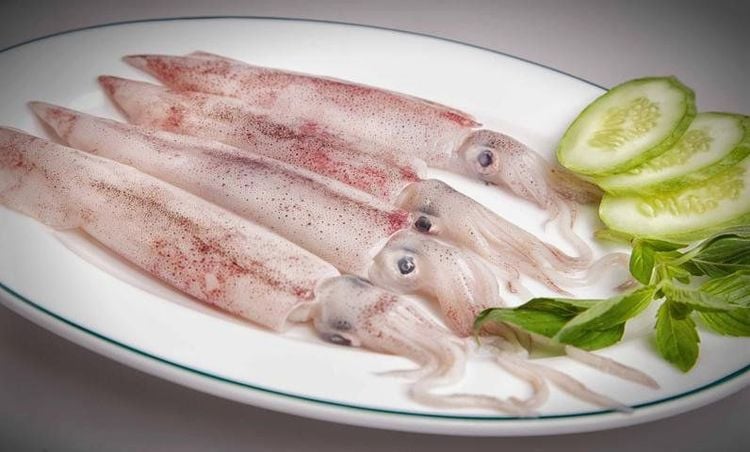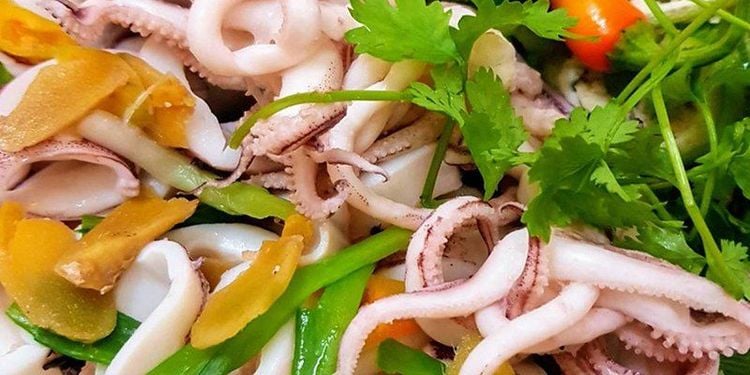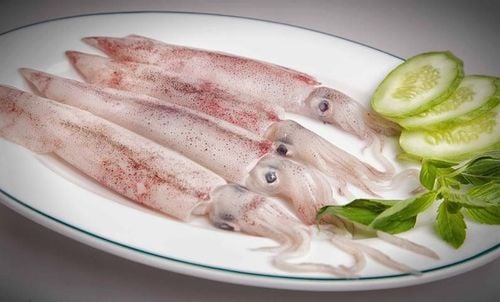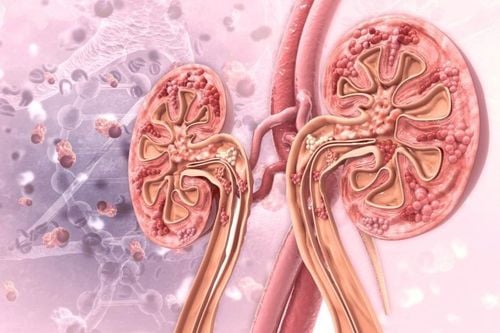This is an automatically translated article.
Squid is a favorite dish of many people and can be processed into many different dishes such as grilled or fried. So what is the effect of eating squid and is it good to eat a lot of squid?1. Ink overview
Squid is a species of mollusk with high commercial value. Squid (lat. Teuthida) - belongs to the order cephalopods, unlike octopuses, they have ten tentacles. Squid is considered an excellent swimmer because of its ability to swim great distances. They move with the help of a type of jet engine: a small hole in their body responsible for creating the thrust that helps them move.Among squids, there is one of the largest molluscs, Architeutis, with tentacles up to 16 meters long. Architeuthis (giant squid) (Latin Architeuthis) is a genus of deep-sea squid that makes up an independent family Architeuthidae. This is the strongest invertebrate, their strength can be compared with sperm whales.
In the Far East, near the Primorsky and Sakhalin coasts is where the Pacific squid is mainly found. In the sea, this mollusk is light green in color. But it is worth removing it from the water, as the color immediately changes and is brick red, sometimes brown. The weight of squid living in the waters of the Far East is very small - only about seven hundred and fifty grams.
In some countries, reels or hooks are used for squid fishing. Squid fisherman will sit on a boat. A fishing rod with many hooks attached to a thin and strong fishing line, ten to fifteen meters long, attached to a short and flexible rod.
But it is worth luring the squids out of the depths of the sea using underwater and surface light for this, since at a depth of one meter they can be caught with a slingshot. Squid fishing is usually done around the evening, when sunset falls. The larger squids live far from the coast and the smaller ones live closer to the coast.
Squid after fishing needs to be sent to the processing place as quickly as possible. Ink is lined up in a box or basket, with tentacles in different directions, otherwise they can gnaw at each other and this will deteriorate the appearance of the product.
In recent years, the world's ink production and consumption has more than doubled. And the catch of this mollusk has increased more than five times. Experts believe that squid production can increase from 15 to 20 tons per year!

Ăn mực có tác dụng gì là thắc mắc của nhiều người
2. What is the effect of eating squid?
Squid is a popular seafood in the world. It's cheap, easy to find, and most importantly, delicious. Squid can be prepared by grilled, marinated, boiled, braised and even eaten raw as sashimi.One of the most common ways to prepare squid is chopped, breaded and fried. This species of squid is popularly known as squid, although the term "squid fish" technically covers any species of squid used for food. Fried calamari has more calories than most other calamari preparations.
Commercially farmed squid are usually caught offshore, sometimes far at sea. Many different species of squid are caught and put to use. In 2002, the most commonly caught squid species were European squid, Argentine shortfin squid, jumbo flying squid and Japanese flying squid. The jumbo flying squid fishery is currently the highest in the world.
Obviously, the demand for ink is very high. This raises the question of whether eating a lot of squid is good? Here, let's find the answer to the above question.
A serving of raw squid about 100 grams contains:
Calories: 104 Protein: 18 grams Fat: 2 grams Carbohydrates: 3 grams Fiber: 0 grams In addition, squid is also a source of some vitamins and minerals. such as:
Vitamin C Iron Calcium The health benefits of squid are often related to its high protein content. Other benefits are tied to its polyunsaturated fat content, known as omega-3 fatty acids. The health benefits that squid can give us include:
Supports a healthy pregnancy: The US Food and Drug Administration emphasizes squid as a healthy food for those who are pregnant. pregnant and lactating people. The protein and iron content in squid is considered especially important for pregnant women. Heart Health: The link between the omega-3 fatty acids found in fish oil and heart health has been well-studied. However, the balance of fatty acids in fish oil is somewhat different from that of conventional fish oils on the market. The fatty acid docosahexaenoic acid (DHA) is higher in squid than in other seafood. DHA has been shown to improve resting heart rate. DHA-rich oils, such as calamari oil, may also help reduce platelet aggregation in women. Rheumatoid Arthritis: Research on omega-3 fatty acids found in seafood in general and in squid in particular indicates that they help ease the symptoms of rheumatoid arthritis. Participants in one study reported a significant reduction in their morning stiffness. Besides, the swelling and pain in the joints are also relieved a lot. Eating squid is good for health! That's the claim of nutritionists based on what squid can provide. Squid meat is an excellent source of complete protein. In fact, 100g of this krill contains up to 18g of protein. This number is not inferior to beef or fish with the same volume. Protein serves as the main building material for the body's cells and tissues, with the help of which enzymes and hormones are formed. Protein is a valuable natural source of amino acids (eg, methionine, lecithin) - the irreplaceable raw material of new durable tissues and a reliable source of repair for worn and damaged tissues.
Squid contains most of the vitamins necessary for our body (vitamin PP, vitamin C, vitamin B), iodine, iron, phosphorus, manganese, calcium. Squid meat is superior to other seafood dishes in its potassium content: it is necessary for the normal functioning of all muscles, including the most important - the heart muscle. Potassium helps maintain a steady, rhythmic and regular heart rhythm. This mineral regulates the water-salt balance in the body, preventing edema and hypertension.
In addition, squid contains almost no fat. That is why dishes from them can be safely included during fasting and fasting days. Squid is also an excellent source of copper, which is needed for the formation of hemoglobin and collagen in the body.
Phosphorus in squid plays an important role in the formation and maintenance of healthy bones and teeth. In addition, it is involved in tissue growth and regeneration, and also helps maintain normal blood pH levels. Finally, phosphorus is one of the components of cell membranes.
Squid contains a large amount of zinc. It is involved in immune responses, genetic material production, and wound healing.
Squid is an excellent source of magnesium, which is involved in bone growth, protein formation, enzyme activities, muscle contraction, oral health and the immune system. It also plays an important role in energy exchange and nerve impulse transmission.
Vitamin E in squid has a protective effect on surrounding cell membranes, especially red and white blood cells (cells of the immune system). Vitamin C, contained in squid, is simply indispensable for the body, specifically for the health of bones, cartilage, teeth and gums. In addition, it protects the body from various infections, promotes iron absorption and accelerates tissue healing.

Ăn mực rất tốt cho sức khỏe
3. Risks from eating squid
Squid is generally considered a moderately safe food. The main health risks of squid and shellfish come from their mercury levels and potential for allergenicity.Shellfish allergy: As with any shellfish, squid carries the risk of causing allergic reactions. A substance called tropomyosin found in squid is believed to be the culprit. People with severe allergies to shellfish are advised to avoid eating squid. Mercury Poisoning: Seafood in general and squid in particular have long been known to contain high concentrations of mercury. A build-up of mercury in the body can cause serious harm, especially to children. The U.S. Food and Drug Administration considers squid to be one of the "best choices" for seafood alone, which means it contains relatively low levels of mercury. However, you should keep in mind that any squid you eat may contain mercury. Adults should eat squid and other seafood at most two or three times per week in servings of about 100 grams. For children aged two to 11 years, the recommended serving size is 30 grams.
Squid is one of the most popular seafood in the world for many years. The output as well as the consumption of squid is constantly increasing year by year. This can be explained by the impressive benefits that squid can bring to our health. Not only is it a food containing many important nutrients, squid is also very good for pregnant mothers, supporting heart health and supporting the treatment of acute arthritis.
Please follow the website ( www.vinmec.com ) for more information on health care instructions, which we will update regularly.
Please dial HOTLINE for more information or register for an appointment HERE. Download MyVinmec app to make appointments faster and to manage your bookings easily.
Reference sources: healthy-food-near-me.com, webmd.com












